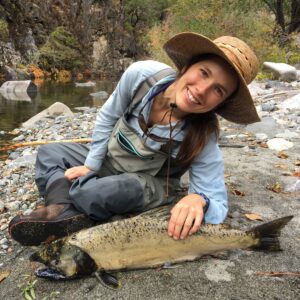Grantham Lab
Freshwater Science & Management
Freshwater Science & Management

I am interested in how units of biodiversity are delineated, managed, and maintained by Western and Indigenous scientists, managers, and practitioners. I focus on premature-migrating Chinook salmon, whose life history makes them uniquely dependent on freshwater ecosystems, and which we now understand to be genetically distinct from later-migrating (i.e., fall) Chinook.
Specifically, I work with Upper Klamath-Trinity River spring-run Chinook salmon, which was granted protection under the California Endangered Species Act in 2021. I seek to understand the impact of competition and hybridization between spring and fall Chinook, juvenile life history differences between runs, and how the reintroduction of traditional fishery management practices and restoration of seasonal and low-flow barriers can be used to maintain reproductive isolation between spring and fall Chinook.
I have a B.S. in the Program in the Environment from the University of Michigan and an M.S. in aquatic biology from Hólar University College, Iceland. I have worked for the United States Geological Survey, the United States Forest Service, and the Partnership for the Interdisciplinary Studies of Coastal Oceans (PISCO) at Oregon State University. Prior to coming to UC Berkeley, I was the Fisheries Program Coordinator for the Salmon River Restoration Council in Sawyers Bar, California.
Please feel free to connect with me through email (amyfing@berkeley.edu) or on Twitter (@amyfing).